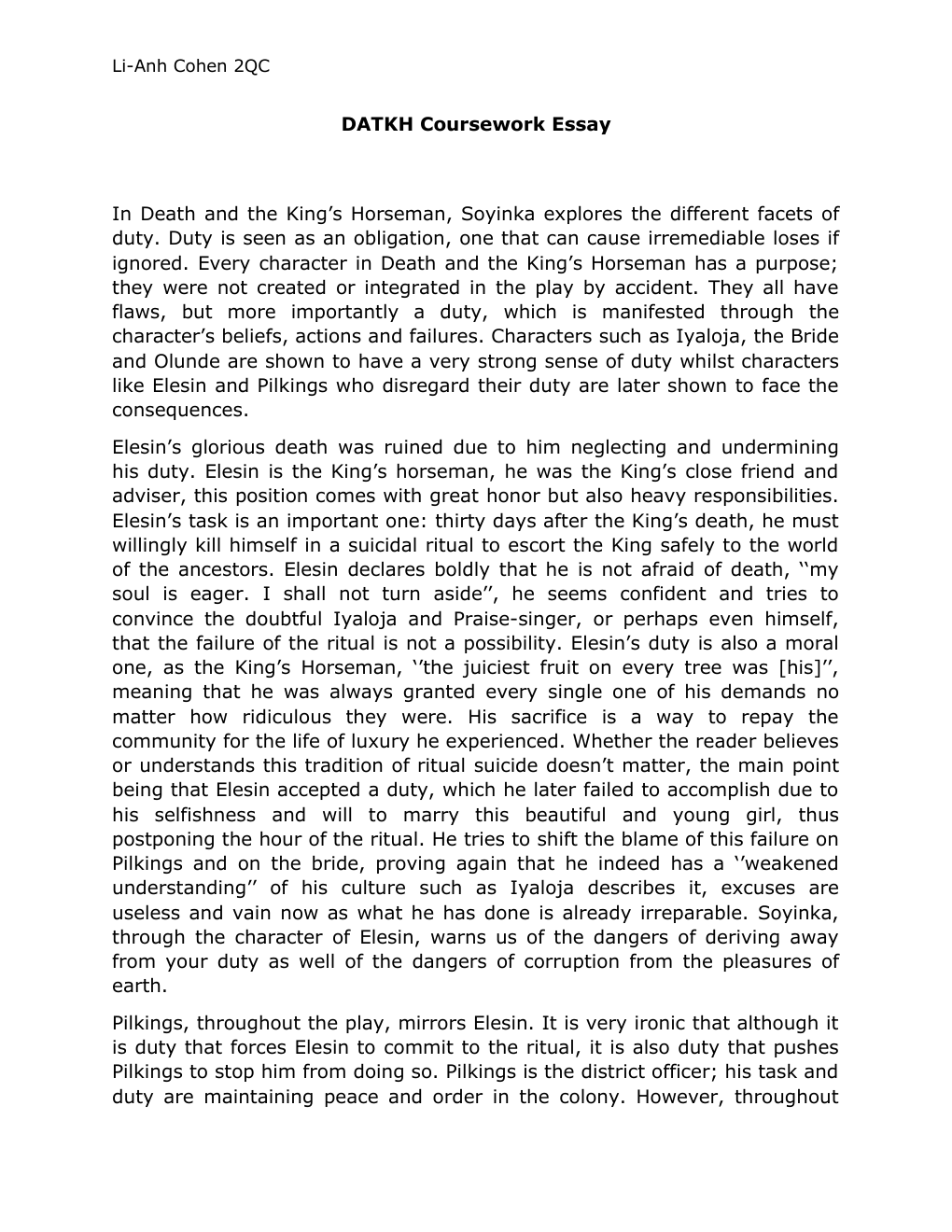Duty in Death and the King's Horseman
Publié le 07/10/2022

Extrait du document
«
DATKH Coursework Essay
In Death and the King’s Horseman, Soyinka explores the different facets of
duty.
Duty is seen as an obligation, one that can cause irremediable loses if
ignored.
Every character in Death and the King’s Horseman has a purpose;
they were not created or integrated in the play by accident.
They all have
flaws, but more importantly a duty, which is manifested through the
character’s beliefs, actions and failures.
Characters such as Iyaloja, the Bride
and Olunde are shown to have a very strong sense of duty whilst characters
like Elesin and Pilkings who disregard their duty are later shown to face the
consequences.
Elesin’s glorious death was ruined due to him neglecting and undermining
his duty.
Elesin is the King’s horseman, he was the King’s close friend and
adviser, this position comes with great honor but also heavy responsibilities.
Elesin’s task is an important one: thirty days after the King’s death, he must
willingly kill himself in a suicidal ritual to escort the King safely to the world
of the ancestors.
Elesin declares boldly that he is not afraid of death, ‘‘my
soul is eager.
I shall not turn aside’’, he seems confident and tries to
convince the doubtful Iyaloja and Praise-singer, or perhaps even himself,
that the failure of the ritual is not a possibility.
Elesin’s duty is also a moral
one, as the King’s Horseman, ‘’the juiciest fruit on every tree was [his]’’,
meaning that he was always granted every single one of his demands no
matter how ridiculous they were.
His sacrifice is a way to repay the
community for the life of luxury he experienced.
Whether the reader believes
or understands this tradition of ritual suicide doesn’t matter, the main point
being that Elesin accepted a duty, which he later failed to accomplish due to
his selfishness and will to marry this beautiful and young girl, thus
postponing the hour of the ritual.
He tries to shift the blame of this failure on
Pilkings and on the bride, proving again that he indeed has a ‘’weakened
understanding’’ of his culture such as Iyaloja describes it, excuses are
useless and vain now as what he has done is already irreparable.
Soyinka,
through the character of Elesin, warns us of the dangers of deriving away
from your duty as well of the dangers of corruption from the pleasures of
earth.
Pilkings, throughout the play, mirrors Elesin.
It is very ironic that although it
is duty that forces Elesin to commit to the ritual, it is also duty that pushes
Pilkings to stop him from doing so.
Pilkings is the district officer; his task and
duty are maintaining peace and order in the colony.
However, throughout
Li-Anh Cohen 2QC
the entirety of the play, Pilkings seems more interested in the arrival of the
Prince visiting the colonies, ‘‘the other provincials are going to be damn
envious.’’ The word ‘’damn’’ emphasizes how much admiration from others
mean to him, which ultimately seems to be what Pilkings prioritize over
duty.
He delays personally taking care of the issue caused by the ritual
suicide to party, and only does so when he is forced to, which is rendered
useless since the ritual still takes place and Elesin ends up killing himself
anyways.
He doesn’t take his duty seriously and ends up losing something:
his credibility.
In that sense, Elesin and Pilkings, who seem like opposites at
first, are quite similar.
The conversation between Jane and Olunde highlights
the fact that the idea of duty is similar in both....
»
↓↓↓ APERÇU DU DOCUMENT ↓↓↓
Liens utiles
- Principal Provisions of the Magna CartaThe Magna Carta was signed by King John of England in response to the complaints of his barons, and thus its emphasis is on the limits of royal authority and the properrelationship between king and subject.
- La surprise au cinéma - Critique The King of Staten Island et Annette
- The danger of space exploration on the human body and the environment
- DEATH ON THE NILE
- Article - The power of words - Words, a powerful political and social weapon ?


